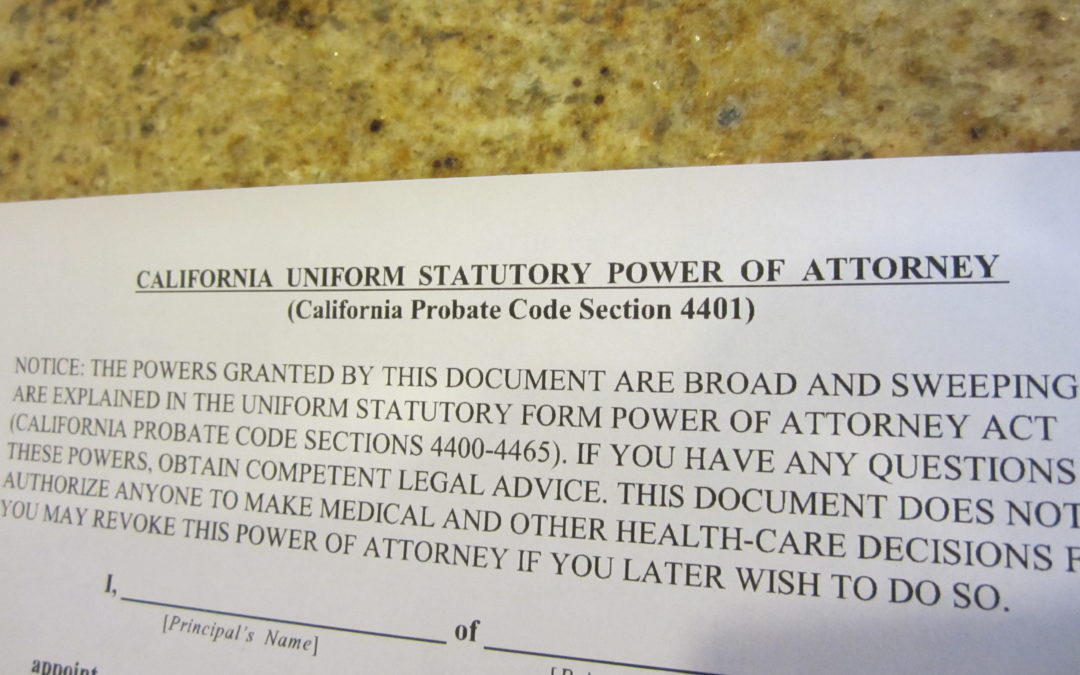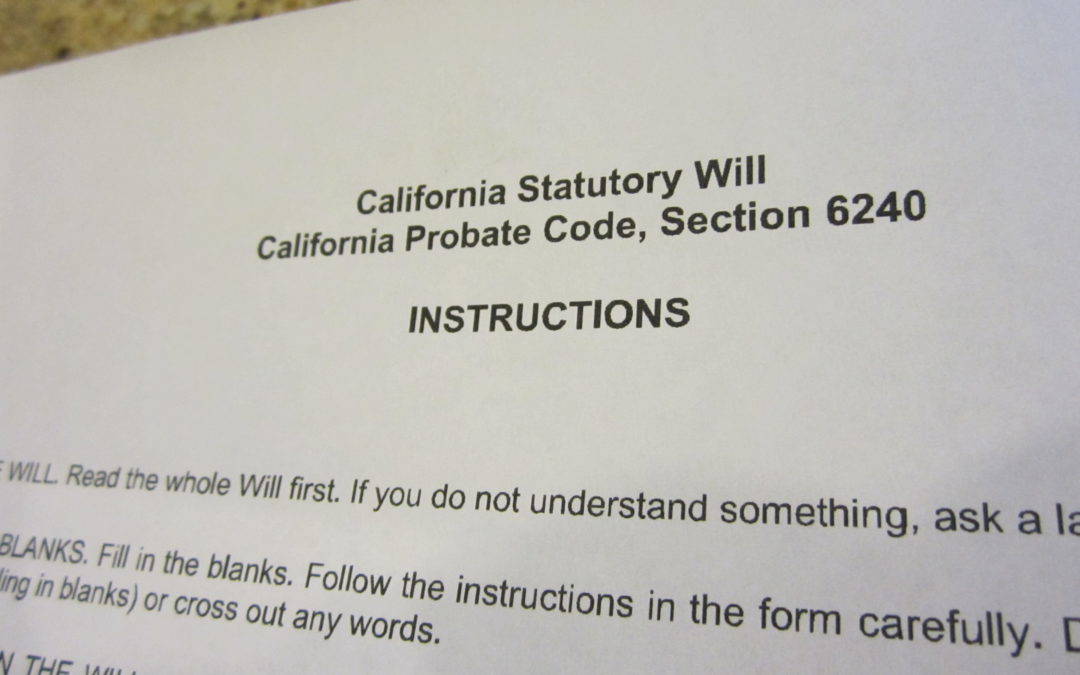
by Andy Chen | Jan 8, 2019 | California, Estate Planning, Family Law, Individual
I had a post before about what happens in California to your will after you get divorced. Many people have their spouses named in their will in some way (e.g. to be executor). In nearly all cases, I would imagine you don’t want your ex-spouse to have control over your estate when you’ve died. Today, though, I’m going to go over a similar question: what happens in California to your Power of Attorney or Durable Power of Attorney document after you’ve gotten divorced? As with wills, many people name their spouses as their power of attorney agent or durable power of attorney agent and, as with divorces, most people likely don’t want their ex-spouses having control over them once the divorce is finally over. The relevant law here is going to be Section 4154 of the California Probate Code, section (a) of which states: “If after executing a power of attorney the principal’s marriage to the attorney-in-fact is dissolved or annulled, the principal’s designation of the former spouse as attorney-in-fact is revoked.” Section 4154(b) then goes on to say that if divorce or annulment of the marriage was the only reason why the power of attorney was revoked, then remarriage of the principal and attorney-in-fact will reinstate the power of attorney and the attorney-in-fact’s authority under it. If, however, the power of attorney was revoked for other reasons too and the principal and attorney-in-fact just happened to get divorced at the same time, then them remarrying does not reinstate the power of attorney and the attorney-in-fact’s authority. If you compare what happens to a will under section 6122 of...

by Andy Chen | Jan 4, 2019 | California, Family Law, Individual
This post is going to be about what happens to assets that were not previously disclosed during a California divorce case. This failure to disclose could be intentional, such as your soon-to-be ex-spouse purposely trying to hide bank accounts and other property from you. For instance, suppose you were a stay-at-home mom and your husband was the one who worked outside the home. Even though all the property the two of you acquired during the marriage is likely going to be community property to which you would be entitled to half, he might view it as all rightfully belonging to him because he was the one who went out to work for it. He might, for example, try to hide it by putting it all under his brother’s name, his elderly mother’s name, etc. The failure to disclose could also be accidental. People can be forgetful, even when they intend to be honest. Depending on your level of wealth, the length of the marriage, etc, it is possible that your soon-to-be ex-husband, for example, might forget that he had a 401K from a job he worked 20 years ago that he has never touched. Theoretically, all assets and debts should be disclosed during a divorce and each party should — in theory — have total access to all information regarding the couple’s finances. The reality, of course, is never that perfect. The fact that financial disclosure during a California divorce is voluntary and on the honor system doesn’t help either. Bottom line: if you’re involved in a California divorce and you believe your soon-to-be ex-spouse is trying to hide...

by Andy Chen | Jan 3, 2019 | Individual, New York
Yesterday, there were news stories stating that a new law went in to effect in New York on January 1, 2019 allowing for birth certificates specifying a non-binary gender (i.e. not male and not female). Here are two in particular: “New York law now allows gender-neutral birth certificates” (kcra.com; January 1, 2019)“New York Rings in New Year by Offering Gender-Neutral Birth Certificates” (dailysignal.com; January 2, 2019) The headlines are misleading for this reason: It isn’t a New York state law. Instead, the law that went in to effect yesterday is a New York City law. This law was signed by New York City Mayor Bill DeBlasio on October 9, 2018 and went into effect January 1, 2019. For those interested, this new law is under the Administrative Code of the City of New York. If you want to look it up yourself, it is Title 17, Section 167.1 entitled “Sex Designation on Birth Records”. As an aside for those interested, California has a law that allows for gender-neutral birth certificates also. Called the Gender Recognition Act, it was passed as California Senate Bill 179 (SB 179) in October 2017 and went in to effect January 1, 2018. At the time, it made California the first state in the US to recognize a third gender. As usual with any blog post regarding New York, I need to make clear that while I am licensed to practice law in New York state, I don’t maintain an office anywhere in the state of New York (at least as of the date of this post). As a result, I can’t practice law there...

by Andy Chen | Jan 2, 2019 | California, Estate Planning, Individual
After you get divorced, a lot of things happen automatically under California law. Many of these things have to do with estate planning. In this post, I’m going to go over how a divorce affects how California treats wills that either spouse has made. In previous posts, I’ve gone over how to make a will in California, how to disinherit your children in your California will, and how to omit your spouse in your California will. If you haven’t seen those posts, I encourage you to go take a look. The relevant law here for how a divorce affects a will is going to be in section 6122 of the California Probate Code. A very similar statute (Section 6122.1 of the California Probate Code) applies to domestic partnerships also. Under section 6122(a), the following happens automatically upon a divorce unless a will executed after the divorce provides otherwise: Disposition of property to the former spouse is revoked;Special and general powers of appointment conferred upon the former spouse are also revoked;Provisions specifying the former spouse as conservator, guardian, trustee, or executor are also revoked. In the event of a divorce, section 6122 treats the former spouse as if they had already died. In the event these spouses get remarried, however, section 6122(b) automatically reinstates/revives these same provisions of the deceased spouse’s will. As always, this post is not meant to be a comprehensive explanation of how a divorce might affect your will or the will in the particular situation you are dealing with. If you are outside of California or your situation doesn’t involve California at all, likely none of...





